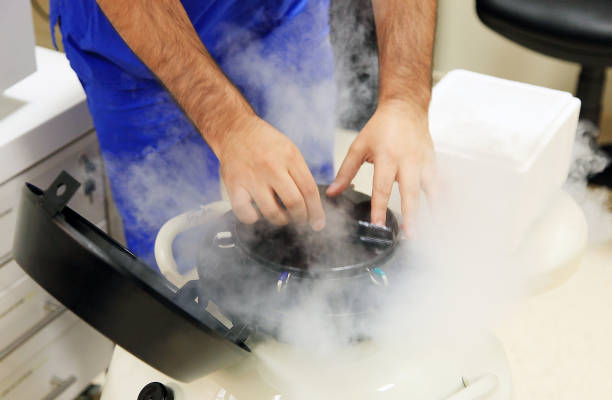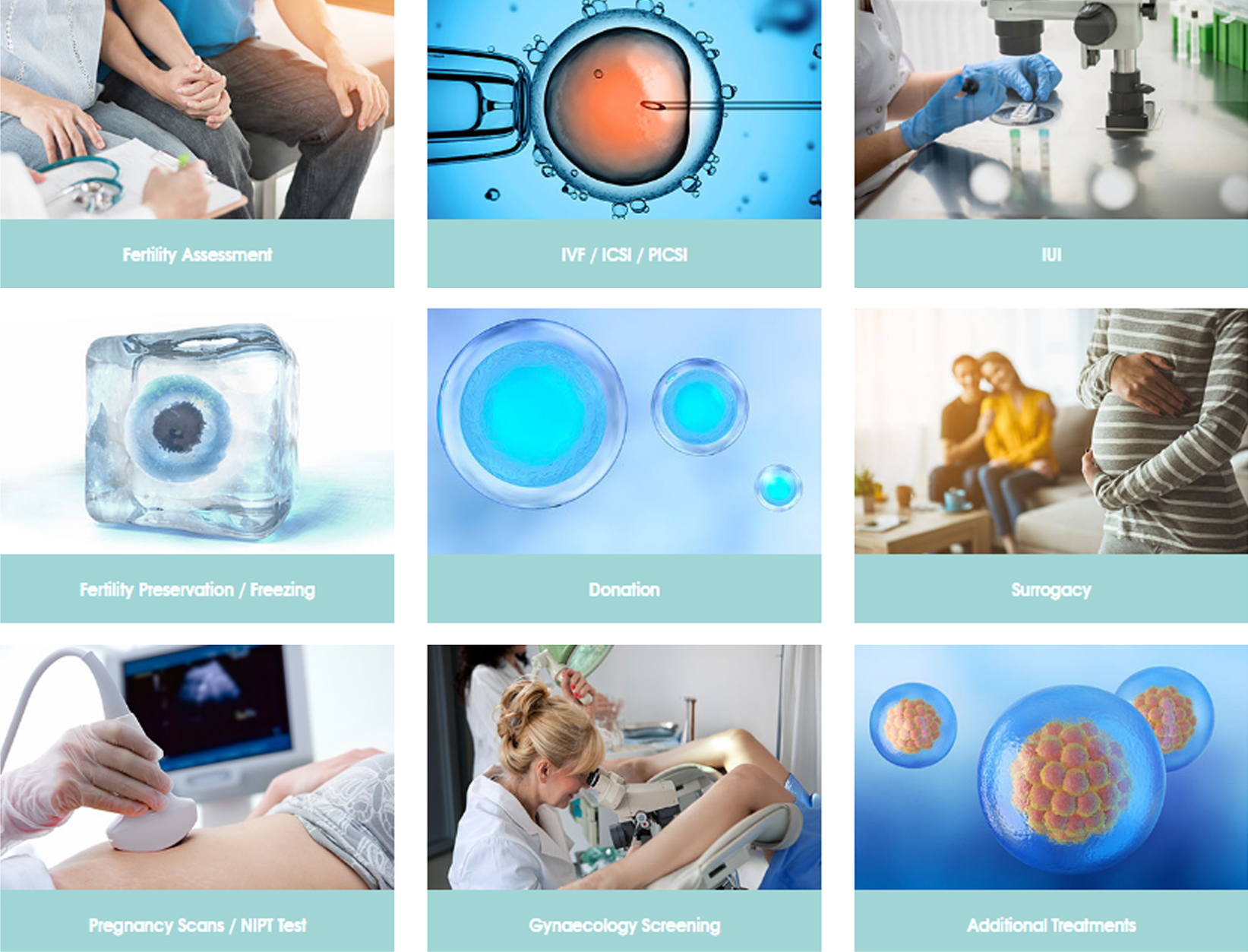26th July 2023
Fertility
Follow the latest news and developments in the world of fertility.
< View all our fertility news and posts


Egg freezing can be an option to consider for fertility preservation
Age-related infertility is increasingly becoming more prominent and problematic as people often choose to start a family later in life due to social reasons. Egg freezing could be the answer to planning family building for a convenient time, without the worry of fertility being impacted by age.
What is egg freezing?
Egg freezing is a reproductive technique that provides the opportunity to attempt to preserve fertility. Patients undertake an egg collection procedure, and mature eggs can be safely stored in liquid nitrogen for many years, enabling people to use them for treatment in the future.
Is egg freezing for me?
There is a known decline in the success of fertility treatment with advancing age. This is due to the number and quality of the eggs being produced by the ovaries reducing over time. An Anti-Mullerian Hormone (AMH) test can be carried out to give an indication of ovarian reserve. Due to the link between aging and declining fertility, a person’s chance of a successful pregnancy with frozen eggs is higher if the eggs are frozen at an early reproductive age.
Egg freezing can be an option to consider for fertility preservation if a person is at risk of premature ovarian failure, premature menopause, or having any medical treatments which may impact the function of the ovaries.
Elective egg freezing, also known as social egg freezing, is fertility preservation for non-medical or non-emergency reasons. As people in the UK are choosing to start their families later in life; the option of egg freezing offers the opportunity to plan family building for a convenient time, without the concern that fertility could be impaired as one grows older.
How are the eggs collected?
Before treatment begins it is necessary to have an appointment to see a consultant, who will be able to discuss treatment and ensure egg freezing is the right option for the person. As with any fertility treatment the person will be required to have routine screening for infectious diseases and provide written consent for storing the eggs. The person will have ample opportunity to discuss their treatment thoroughly with our experienced team and, if required, with a specialist counselor.
To retrieve eggs, the person will initially have fertility treatment using daily artificial hormone stimulation and will be monitored by ultrasound scans. The eggs are retrieved from the ovaries during a surgical procedure, under deep sedation. Once collected the eggs are stored in an incubator in the laboratory before they are prepared for freezing. On average, approximately 70% of eggs recovered are mature, and it is only mature eggs that can be frozen for future treatment. It may be necessary to undergo more than one cycle to freeze a sufficient number of eggs.
How are eggs frozen?
At the Herts & Essex Fertility Centre we freeze eggs using a technique called vitrification. This is a rapid freezing technique that rapidly dehydrates and freezes the eggs preventing the formation of harmful ice crystals.
How long can eggs be stored?
Our regulatory body the HFEA enables eggs to be stored for up to 55 years, with the renewal of the consent to continue storage at 10-year intervals.
How are the eggs used?
When the person is ready to commence treatment to use their frozen eggs, they will first need to be seen by a consultant to discuss appropriate treatment options. Most patients then begin a course of medication to prepare the uterus to receive an embryo.
Eggs are thawed and inseminated by injecting a single sperm into each egg using an ICSI procedure. The following day the inseminated eggs are assessed to determine if they have fertilised normally. Once it is clear how many embryos have formed, the embryo transfer appointment can be confirmed.
Are there any risks associated with storing eggs?
The medical preparations required before eggs can be frozen involve taking medications that can have a range of side effects and carries a potential risk of Ovarian Hyper-Stimulation (OHS). The surgery itself also carries risks that are specific to each patient. All medical risks are discussed in full during the consultation process and robust systems are in place to minimise these risks to all patients.
As with all treatments where eggs are collected from the ovary, there is no way to guarantee that usable eggs will be retrieved. On rare occasions, the ovaries do not respond to the medications, the follicles from which the eggs are collected may be empty, or the eggs collected may not be suitably mature for treatment.
Once frozen, eggs are stored at less than 190°C using liquid nitrogen which must be constantly available to keep the eggs safely preserved. At the Herts & Essex Fertility Centre all of our frozen gametes and embryos are stored in liquid nitrogen tanks connected to a temperature monitoring system.
The freezing and thawing process is not without risk to the eggs themselves, as it involves the physical movement of the eggs and changes to the chemical environment in which they are stored. At Herts & Essex Fertility Centre we currently have a survival rate of over 80% after thawing, which is in line with published rates from other clinics.
Egg freezing is still a relatively new technology, but studies have been carried out and have found that there are no clinically relevant adverse effects on obstetric and perinatal outcomes for pregnancies conceived from vitrified eggs (Ana Cobo, 2014).
Is it successful?
Egg freezing is still a relatively new technology, and the ability to store eggs long-term means that the number of egg thaw cycles in the UK is quite small. But over the ten years since 2009, the number of IVF cycles using frozen eggs in the UK has increased tenfold, to 2400 cycles per year (HFEA, 2021).
At Herts & Essex Fertility Centre, the data sets available are too small to get statistically significant data, but the outcomes for many of the patients that we have treated are encouraging at this early stage.
How many eggs should be stored?
A recent study was published that aimed to predict the likelihood of having a live birth based on the age of the person freezing eggs and the number frozen (R.H. Goldman, 2017). Their result, which is reflective of other similar studies, showed that the majority of patients under 37 would be predicted to have a child, provided at least 10 eggs were collected.
Where can I get more information?
The Human Fertilisation and Embryology Authority (HFEA) have a dedicated web page on egg freezing that can provide you with further information on this procedure. For further information on egg freezing contact the team at the Herts & Essex Fertility Centre on 01992 78 50 60.
References
Ana Cobo, V. S. (2014). Obstetric and perinatal outcome of babies born from vitrified oocytes. Fertility & Sterility, 1006-1015.
HFEA. (2021). Fertility treatment 2019: trends and figures. Human Fertilisation & Embryology Authority.
R.H. Goldman, C. R. (2017). Predicting the likelihood of live birth for elective oocyte cryopreservation: a counseling tool for physicians and patients. Human Reproduction, 853-859.






